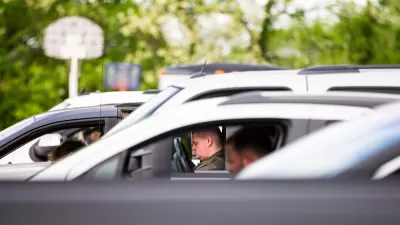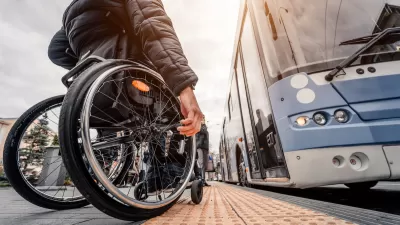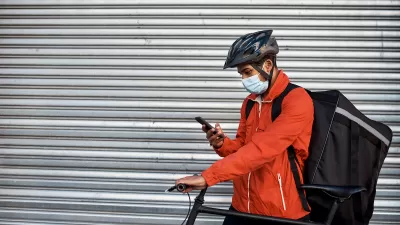People who are physically unable to drive can benefit from effective public transit systems and accessible, mixed-use neighborhoods.

The car-centric infrastructure that dominates most U.S. cities makes navigating the public realm more difficult for many groups, including people with disabilities.
As Matthew Rozsa explains in a piece on Salon, “there is a crucial difference between not driving for economic or ecological reasons — or, in extreme cases, due to legal consequences for crimes like driving while intoxicated — and not driving because your body makes the task physically impossible. In the latter scenario, being unable to drive isn't merely an inconvenience. It becomes another manifestation of a person's disability, and a particularly debilitating one at that.”
Zoe Gross, director of advocacy at the nonprofit Autistic Self Advocacy Network, told Salon in an email that “not being able to drive can significantly worsen a person's life, especially if they live in an area of the country with little or no public transportation.”
People who are unable to drive, regardless of their ability, can face discrimination in employment, education, healthcare, and other important areas. Advocates say supporting people with disabilities involves building robust public transportation systems and putting a stronger focus on accessibility in infrastructure and mobility projects.
FULL STORY: The hidden ways our car-obsessed culture is especially hard on disabled people

Maui's Vacation Rental Debate Turns Ugly
Verbal attacks, misinformation campaigns and fistfights plague a high-stakes debate to convert thousands of vacation rentals into long-term housing.

Planetizen Federal Action Tracker
A weekly monitor of how Trump’s orders and actions are impacting planners and planning in America.

San Francisco Suspends Traffic Calming Amidst Record Deaths
Citing “a challenging fiscal landscape,” the city will cease the program on the heels of 42 traffic deaths, including 24 pedestrians.

Adaptive Reuse Will Create Housing in a Suburban Texas Strip Mall
A developer is reimagining a strip mall property as a mixed-use complex with housing and retail.

Study: Anti-Homelessness Laws Don’t Work
Research shows that punitive measures that criminalized unhoused people don’t help reduce homelessness.

In U.S., Urban Gondolas Face Uphill Battle
Cities in Latin America and Europe have embraced aerial transitways — AKA gondolas — as sustainable, convenient urban transport, especially in tricky geographies. American cities have yet to catch up.
Urban Design for Planners 1: Software Tools
This six-course series explores essential urban design concepts using open source software and equips planners with the tools they need to participate fully in the urban design process.
Planning for Universal Design
Learn the tools for implementing Universal Design in planning regulations.
Heyer Gruel & Associates PA
JM Goldson LLC
Custer County Colorado
City of Camden Redevelopment Agency
City of Astoria
Transportation Research & Education Center (TREC) at Portland State University
Jefferson Parish Government
Camden Redevelopment Agency
City of Claremont





























